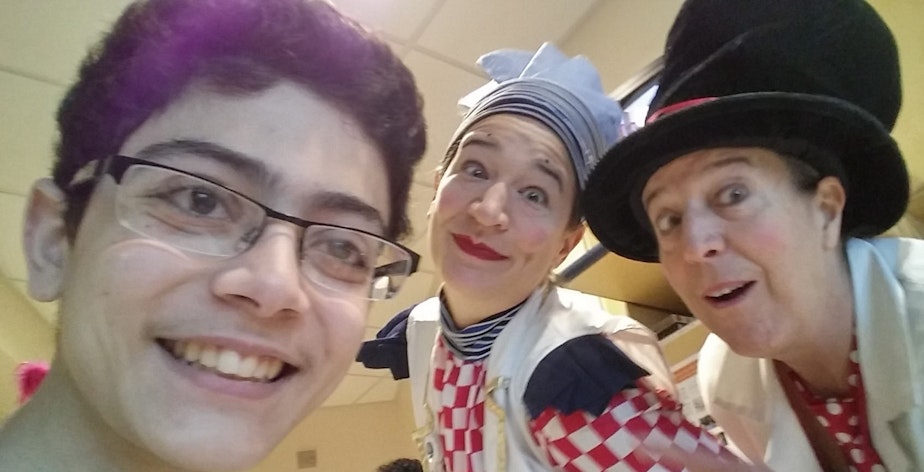Attack of the angry colon: How I deal with my chronic illness

T
he bathroom is a universal experience, right?
Well, not for me.
Instead, I am one of the very lucky 1.5 million with an inflammatory bowel disease, specifically ulcerative colitis (UC).
Basically, UC means my colon is trying to kill me.
When I was diagnosed, my doctor told me I would hopefully get better in two weeks. In two weeks, I was not better. Instead, I realized that this was something that wasn't just going to go away.
I talked to Katherine Walter, a therapist who works at Catalyst Counseling in Bothell, about how people cope with chronic illness.
"With chronic illness," she said, "You can't just beat it down, and then it's destroyed and you're a gladiator. This is something you actually have to live with.
"It's a partner in your life, and it might not be a partner you ever wanted."
For me, this partner not only caused terrible and bloody diarrhea, but also urgent diarrhea.
I would be enjoying my lunch or taking a test, and in just seconds, everything would change, and I wouldn't be able to think about anything other than running to the bathroom. There was a chance I wouldn't make it in time, and I didn't want to deal with that embarrassment.
Even when I did send my colon gifts of medicine to calm it down, it still sucked. The medicine had side effects, which I also hated.
But everyone's experiences are different.
 1 of 3The author, who is now 17, working at RadioActive's summer workshop. He was diagnosed with ulcerative colitis when he was 12.
1 of 3The author, who is now 17, working at RadioActive's summer workshop. He was diagnosed with ulcerative colitis when he was 12."Chronic illness is a crisis," Katherine told me. "Some people respond by becoming very organized, asking a lot of questions. Other people might respond by retreating."
My reaction was to fight.
It was like me versus my colon. If my colon attacked, I attacked back with a diaper. I had things to do, and I wasn't going to let my colon control me.
I didn't always win this fight, though. One time, when my symptoms were really strong, I got an infection. I was in so much pain that I didn't want to move, but I constantly had to get up to go to the bathroom.
This was one of the only times I had to miss school.
During times like that, it was hard to keep positive and think about anything other than why I was lucky enough to have this disgusting disease.
This fight finally ended when I decided to have my colon completely removed. If it didn't want to be a part of me, then it didn't have to be.
After that, my symptoms basically disappeared. My ostomy, or poop bag as I like to call it, has its own set of problems, but they are so much more manageable.
I'm comfortable sharing my story. I mean, I'm telling you about my poop right now! But for many, it's hard to let others know about a weakness they have.
I wanted to interview one of my friends, but she was too afraid to share. She hasn't told anyone outside of her family other than me.
"Chronic illness by definition can sometimes be very isolating," Katherine told me. "If you're not sharing your emotions, those emotions don't go away.
"It's a good idea to have people that you feel you can share your life with."
Not all people fear sharing this much.
William Palmer is a college student with Crohn's disease, another type of inflammatory bowel disease. He says his friends have always reacted well when he has told them about his illness.
"They didn't care about the disease," William told me. "They just cared about me."
This is the same reaction I have experienced. People want you to feel good.
"Getting diagnosed with Crohn's was probably harder for my parents than it was for me," Will said. "They care about me a lot.
"I didn't want to put them through pain, and I felt terrible about it."
It amazes me that William cares more about how others feel when he's the one who actually has the disease.
I never thought about how others felt. But when I shared, I tried to lighten the mood by joking. Otherwise, people might pity me, and that would make me feel worse.
If I joked, everyone could laugh, and I could feel better about it.

It isn't all bad, though. Ulcerative colitis did help me become more conscious of what I eat and put into my body, especially when I go grocery shopping.
Because UC made me deal with something difficult, I became more empathetic and understanding of others' situations.
It's not the partner I would've wanted, but in the years since getting diagnosed, I've learned to never let UC stop me from being me.
Still, I hope you never have to deal with not pooping so good.
Correction, 10:09 a.m., 10/17/18: The original version of this story referred to ulcerative colitis and Crohn's as "irritable bowel diseases", instead of inflammatory bowel diseases.
This story was created in KUOW's RadioActive Intro to Journalism Workshop for 15- to 18-year-olds at Jack Straw Cultural Center, with production support from Andrew Stuckey. Edited by Ruby de Luna.
Find RadioActive on Facebook, Twitter and Instagram, and on the RadioActive podcast.







